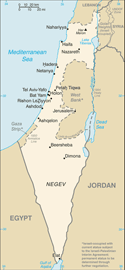| Israel Information |
| Israel History |
| Israel Food |
| Israel Transportation |
| Israel Culture |
| Israel When to go |
| Israel Weather |
| Israel Good to know |
| Israel Visa and Passport |
| Israel Nightlife |
Population: 7,233,701 Dialing Code: +972 Languages: Hebrew (official), Arabic used officially for Arab minority, English most commonly used foreign language Religions: Jewish 76.4%, Muslim 16%, Arab Christians 1.7%, other Christian 0.4%, Druze 1.6%, unspecified 3.9% (2004) Internet TLD: .il Located: Middle East, bordering the Mediterranean Sea, between Egypt and Lebanon Area: 20,770 sq km Residents with HIV: 5,100 Literacy: 97.1% Comparative Size: slightly smaller than New Jersey Nationality Noun: Israeli(s) Nationality Adjective: Israeli currencyILS |

Israel, a small yet diverse, holy, ancient region, which was promised by God to the descendants of Abraham through his son Isaac, is repeatedly described in the Torah as a land flowing with milk and honey. It is bordered by the Jordan River and the Dead Sea and a small window on the Red Sea at the Gulf of Eilat, straddling a long coastline to the east of Mediterranean Sea. Though comparatively diminutive in size, Israel's landscape is speckled with a wealth of plants and wildlife as well as many natural attractions, historical sites and archeological wonders. The Belvoir Castle, which is auspiciously nestled above the Sea of Galilee, welcomes a sea of tourists every year. Ruins of the Egyptian, Canaanite and Roman amphitheatres can be seen at Bet Shean, while the evocative relics of Herod are in the city of Caesarea known as the Roman capital by the sea.
The Dead Sea, which is the lowest point on Earth, is renowned for its hypersalinated water where one can float with ease. On the other hand, the freshwater lake of the Sea of Galilee is a refreshing contrast to that. This is the playground of cultural activities and a natural destination for pilgrimage among the Christians. Its beaches offer a prime recreational spot for locals as well as visitors. Ein Gedi, a nature reserve, is a convenient choice for nature lovers for the reserve houses a botanical garden and a kibbutz, a collective community that is traditionally based on agriculture. The land is rich with artifacts dating back to the Davidic times, century old scrolls, coins, and clusters of papyrus containing Bar Kokhba's order, which was found in the Judean desert by Yigael Yadin, an Israeli archeologist.
Israel celebrates the Passover or Pesach anytime between March and April, depending on the Hebrew calendar. During this occasion, travelers will not be served any product made of flour except matze, a kind of unleavened bread. Gustatory treats abound in Tel Aviv streets: falafel (chickpea nuggets in pita bread with freshly cut veggies and sauerkraut), sabich (fried eggplant served in pita with salad and tehina), krembo (chocolate confection), and the famous hummus (chickpea spread) will surprise the palate of tourists.

 Planning a short visit? Check out
Planning a short visit? Check out 
